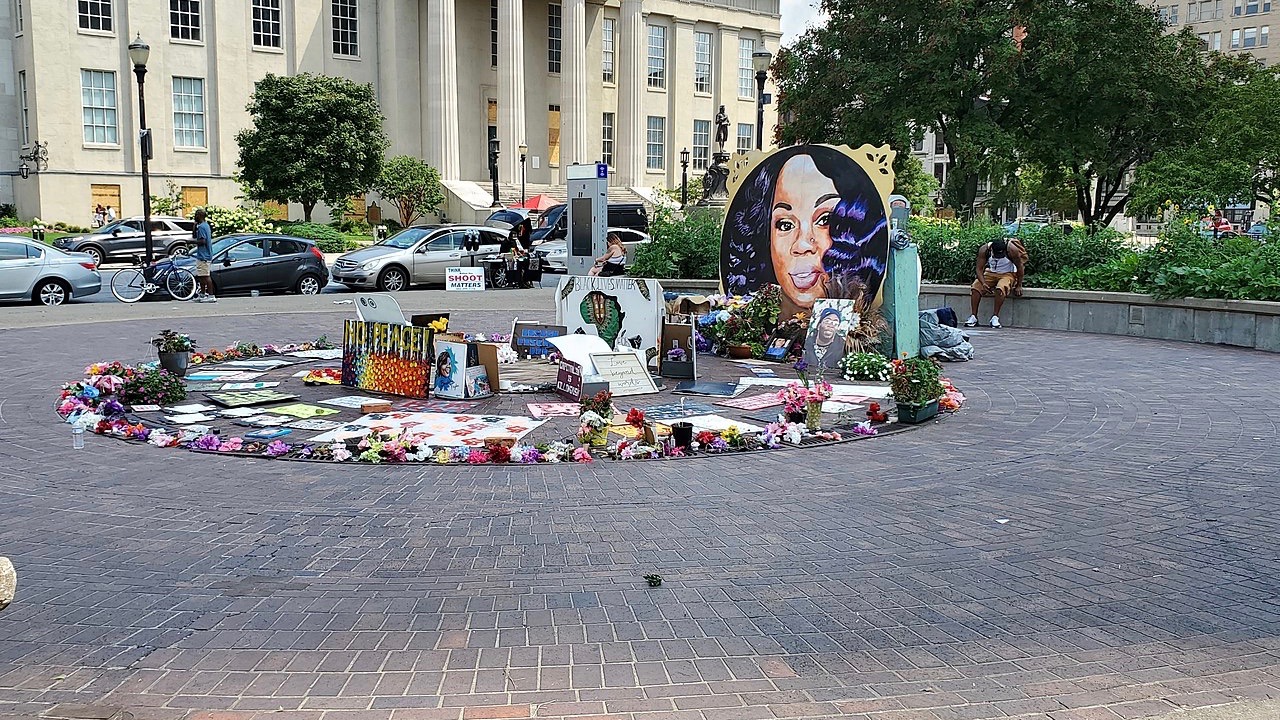On September 23, Wednesday, a jury in the US State of Kentucky refused to charge the three officers involved in the fatal shooting of medical worker Breonna Taylor in Louisville. Instead of a murder indictment, as was requested by Taylor’s family and supporters in a lawsuit claiming wrongful death, the jury only sanctioned indictment against one of the officers for supposedly endangering the lives of the victim’s neighbors with police firing.
Brett Hankison, who was expelled from the Louisville Metro Police Department, will be facing three charges of “wanton endangerment” for blindly firing 10 rounds of bullets at a neighbor’s apartment window. The jury brought up the low-level felony charges which only carry a maximum prison of five years each.
The jury also decided to let off Jonathan Mattingly and Myles Cosgrove, who had shot 20 rounds at Taylor and her partner inside her apartment. The jury was impaneled by Kentucky state attorney general Daniel Cameron, who is from the Republican Party.
The Taylor family have expressed their disappointment with the outcome of the lawsuit, which their lawyer characterized as “outrageous and offensive”.
Evidence contradicts jury’s decision
The family’s lawsuit was rejected by the jury despite the fact that forensics had found six bullets on Taylor’s body. It was also established that Cosgrove’s bullet had killed Taylor. Hankison, on the other hand, was not even present inside the apartment when the killing took place. However, he is the only one of the three accused officers to have faced termination from his job.
The jury found that the police officers acted in self-defense after the police department argued that the officers had announced themselves while breaking into the apartment as part of an alleged drug bust in March this year, and that they only responded to shots fired by Taylor’s partner Kenneth Walker.
But the police were not able to justify their stand with enough evidence. Cameron, who acted as a special prosecutor in the case, fell back on one witness who had supposedly heard the police announce themselves before going into the apartment.
The police’s account has been disputed by 11 witnesses apart from Walker, who have testified that the officers did not announce themselves beforehand. Publicly released evidence from the legal team representing the family shows that the three officers broke into the victim’s apartment in plain clothes and came in an unmarked car, with a no-knock warrant. Walker made an emergency call to 911 reporting what he assumed to be a break-in by criminals.
Taylor’s family and lawyers have argued that ad Walker fired in self-defense, assuming a criminal break-in. Photographic evidence, recently released by the lawyers, corroborated the family’s claims and also showed that at least one of the officers had a body camera, which the police department had denied.
People protest the jury decision
Louisville has been witnessing major protests and demonstrations since March to demand justice for Taylor. These protests intensified after the killing of George Floyd in May, which had led to nationwide protests. Outrage poured in from across the country following Wednesday’s indictment. Civil rights activists have condemned the indictment as a major miscarriage of justice.
What kind of justice is that when all the cops who smashed down Breonna Taylor's door of her home and fired multiple shots are not charged with murder? None! Stop the War Against Black America!
— La Riva 2020 (@LaRiva2020) September 23, 2020
The authorities of Louisville have announced a nightly curfew for the next three days, expecting further protests from outraged residents. State governor Andy Beshear from the Democratic Party has also imposed a state of emergency in the city since Monday. He deployed the National Guard on Wednesday, hours before the indictment was to be announced.
Nevertheless, intense protests were witnessed across Louisville within hours of the indictment. Hundreds hit the downtown area of the city and outside police precincts, despite a lockdown order in place from the governor.
According to reports, the police preemptively fired flashbangs and tear gas at demonstrators 30 minutes before curfew was to begin. This escalated to confrontations with the protesters in some places, but the protests remained largely peaceful. 127 arrests have been made so far across the city, with further police repression expected as the protests continue to intensify.
Hundreds also participated in protests organized in different parts of the country, opposing the indictment.
Chicago has at least four protests for #BreonnaTaylor tonight. Two on the south side, one downtown and one on the north side. Stay in these streets. Fists up ✊🏾 #FightingForOurLivesMeansSavingTheWorld https://t.co/iGMBjxwyZm
— BLMChicago (@BLMChi) September 24, 2020
Thousands marching in NYC tonight for #BreonnaTaylor @CBSNewYork pic.twitter.com/OpCtwznoB2
— Ali Bauman (@AliBaumanTV) September 24, 2020
#HappeningNow San Diego protest for Breonna Taylor and #BlackLivesMatter at 8th and B in Downtown. pic.twitter.com/M2pBAFX3Us
— Nick Serrano (@TheNickSerrano) September 24, 2020





